Fitch begins the introduction to his heretical work with two basically-flawed premises that there are “only two types of power in the world” and that “God’s power is never coercive.”
“I hope you will put up with me in a little foolishness. Yes, please put up with me! I am jealous for you with a godly jealousy. I promised you to one husband, to Christ, so that I might present you as a pure virgin to him. But I am afraid that just as Eve was deceived by the serpent’s cunning, your minds may somehow be led astray from your sincere and pure devotion to Christ. For if someone comes to you and preaches a Jesus other than the Jesus we preached, or if you receive a different spirit from the Spirit you received, or a different gospel from the one you accepted, you put up with it easily enough.“
-2 Corinthians 11:1-4
False Premise #1 (there is an either/or of just “two powers” at work in the world)
In the Garden of Eden, there were three distinct entities in the Genesis account of the fall of mankind. Each of the two created entities possessed their own power which God (the Creator, whose power is unlimited) endowed/permitted:
- God (unlimited power)
2. Adam and Eve (limited powers of free will, and powers to rule over the earthly creation)
3. Satan (limited powers to lie, deceive and bring death)
“You belong to your father, the devil, and you want to carry out your father’s desires. He was a
murderer from the beginning, not holding to the truth, for there is no truth in him. When he lies,
he speaks his native language, for he is a liar and the father of lies.”–John 8:44
Therefore we know throughout the Old and New Testament scriptures evidences of three types of power:
- God’s power
- Man’s (worldly) power
- Satanic power
Three powers, not two.
In John 19, Jesus essentially makes one statement about all three powers, if we link His statement that He has the power to lay down His life and the power to take it up again (John 10:18), and that Satan entered (empowered) Judas the betrayer (John 13:27):
Jesus answered, “You would have no power over me if it were not given to you from above. Therefore the one who handed me over to you is guilty of a greater sin.”
John 19:11
False Premise #2 (God never acts in a way that is considered “coercive”)
As for God’s power “never being coercive,” one just needs to read the account of Saul’s conversion as a reminder that coercion is a complicated word. While it is true that even after Paul was struck blind that he could have still continued persecuting the risen Christ, it would be a stretch to conclude that God’s actions were entirely free of anything that might resemble coercive power. To say that God is never coercive stands in stark contrast to things written of Him all the way back to Genesis, when he banished Adam and Eve from the Garden.
To say that Adam and Eve simply left the Garden on their own volition would be an odd way of understanding the most basic premise the entire gospel rests upon: the sinfulness/fallen nature of man bringing separation from God, and man’s unconditional need for spiritual salvation and freeing from the power of death and Satan.
True, God’s acts of power that appear coercive cannot be labeled as a form of evil, since God is holy, righteous and to be feared. Fitch writes of a God who “invites” submission, rather than requires submission:
“The Scriptures bear witness to the two powers. They tell a continual story of God inviting His people to submit to His power and join with Him in His power as He works for the healing of the world.”
Fitch, David E.. Reckoning with Power: Why the Church Fails When It’s on the Wrong Side of Power (p. 47). Baker Publishing Group. Kindle Edition.”
Clearly, Fitch’s book and fixation is about power.
But it is not about God’s invitation to turn to Him, to love Him, to willingly submit to His will for our lives–to come into right relationship with God and enter into Christ’s saving work through faith and baptism–but rather, it is about being on the “right side of power” (as it also connects politically to the idea of being on the “right side of history”) which he names “God’s power” (power under, rather than power over) for the “healing of the world.” (ie “social justice”)
While that superficially sounds good, right and true, to understand what Fitch is really advocating for requires a lot of unpacking (as they say).
Fitch has a political agenda, plain and simple. And I attempt here to lift back the linguistic veneer in specifics, so his readers and disciples can recognize not only his sleight of hand, but the same patterns of faulty hermeneutics and other dialectic mechanisms currently being utilized and weaponized by other leaders/voices in the Christian Church. I don’t care how many prooftexts Fitch references and how cleverly he (and many others) rearrange, reimagine, reconceptualize and reinvent the gospel and biblical truths, his understanding of the kingdom of God and being a follower of Jesus is simply off base.
So when Fitch “invites you” into his erroneous, Christianized political ideology, just say “no.”
“An SDS radical once wrote, “The issue is never the issue. The issue is always the revolution.” In other words the cause – whether inner city blacks or women – is never the real cause, but only an occasion to advance the real cause which is the accumulation of power to make the revolution.”
― David Horowitz, Barack Obama’s Rules for Revolution: The Alinsky Model
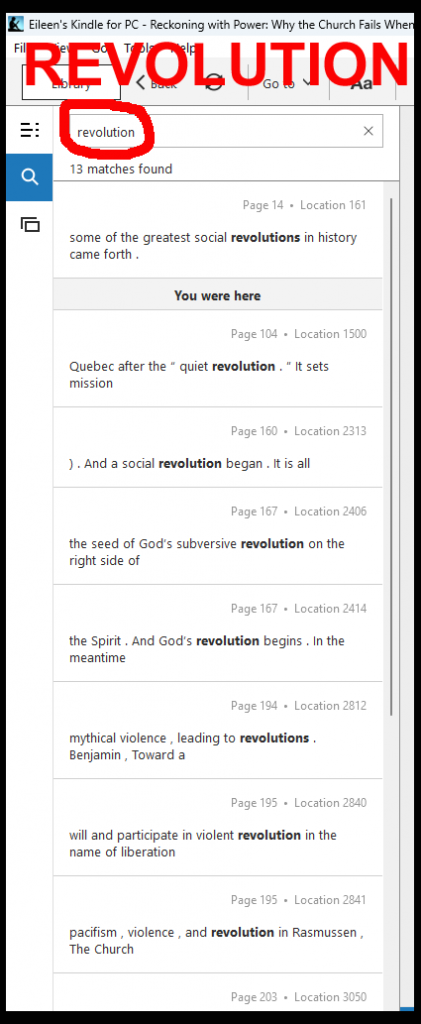
As I work through Fitch’s book, I ask readers to take note of the number of times various socio-political buzzwords (here is one example of a more exhaustive list of such words) can be located through Kindle’s search tool. Ultimately, those interested in matters pertaining to God’s Church can read for themselves to hear the context of these words/concepts/ideologies. I just want to give a heads up what to listen for.
I don’t write this review for those Christians already steeped in heralding the entrance of social justice political agendas into their local faith communities, for they are unlikely to do anything but dig in to their Hegelian-Marxist positions, justifying it from holy scripture.
But rather, I write this review for those Christians who wish to not depart from the holy scriptures nor exchange the biblical kingdom of God for worldly agenda/wordly power-kingdoms. Yes, I write this review–this fearless speech (“parrhēsia” of sorts)–so that those who seek discernment can learn further and recognize how this slippery creature of social justice/CRT theology is slipping into our churches.
I recently heard someone say of these Church matters, “How can you catch smoke?” I liked that analogy, which is akin to the “slippery creature” analogy I’ve found myself using. False teachers/false teachings don’t announce themselves. They don’t show up in your church one day and say, “Hi, my name is _____ and I’m a false teacher.”
Linguistics (or what is called the dialectic in Hegel’s writings) will be my central focus in this piece.
“Hegel’s different way of thinking has become known as dialectical thinking. What makes dialectical thinking so difficult to explain is that it can only be seen in practice. It is not a “method” or a set of principles, like Aristotle’s, which can be simply stated and then applied to whatever subject-matter one chooses.
–Excerpt from Hegel for Beginners (from the Marxists.org website)
How do we begin to understand how this dialectic works?
First, by beginning to appreciate Hegel’s unique philosophical ambition.”
And now, we hear Fitch parroting social justice/Hegelian-Marxist rhetoric:
“The church, as well, is urged to get on the right side of history. A century ago, following in the spirit of Hegel and Marx, American Protestants believed that inherent progress (called a dialectic) was built into history. Mainline Protestants were postmillennialists, believing that the kingdom of God had been set loose into history. Walter Rauschenbusch—to name one paragon of this theology—preached that the kingdom of God had entered history in Jesus. The church’s job, therefore, is to enlist Christians into this march of history for justice. The church, Rauschenbusch said, needed to cooperate with bringing the whole world toward the justice at work in these historical processes set loose in the kingdom of God.”
–Fitch, David E.. Reckoning with Power: Why the Church Fails When It’s on the Wrong Side of Power (p. 170). Baker Publishing Group. Kindle Edition.
Above, we hear Fitch identify the “church’s job” as enlisting Christians into “the march of history for justice.” Fitch certainly does not exegete this from scripture, but rather draws upon Communist/Marxist ideology:
“The “Long March through the Institutions” was a phrase attributed to the Italian communist Antonio Gramsci (1891-1937) and then coined as a succinct mission statement by Marxist student activist Rudi Dutschke in the 1960s.
—The Long March through the Institutions of Society
Fitch’s indoctrination of Christians into Marxism includes such statements as the following:
“And so, when it comes to the church’s work for God’s justice in the world, the question of which side of power the church will occupy moves to the forefront. The church that is on the wrong side of power will inevitably be apostate. The church that lives under the power and presence of God, on the right side of God’s power, is unleashed for social revolutionary works of salvation.“
–Fitch, David E.. Reckoning with Power: Why the Church Fails When It’s on the Wrong Side of Power (p. 21). Baker Publishing Group. Kindle Edition.
At this point I recommend readers eventually exploring this excellent talk called The Theology of Marxism. In one regard, I’m glad I read Fitch’s book. While I still think it is hard for me to articulate the essence of Marxism (I think I know it when I hear it, however), my careful research and further exploration prompted by Fitch’s statements (and my desire to more clearly expose this infiltration of false teachings permeating today’s Church by the likes of him and many others) has left me possibly a bit closer to articulation of Marxism.
Like many, we think of Marxism as an economic theory. But it is not. Marxism is a religion–a religion without a god. Economic theories do not answer existential questions. Karl Marx and his predecessors (Hegel, Rousseau) and subsequent followers (Foucault…Rauschenbusch….on to Judith Butler…etc) seek to create “god” through the human “work” of the “actualization of man.” When they reach the actualized man (ex. the New Soviet man) and Marxist utopia, then they have essentially “produced god.”
“Despite Marx’s claim to be a “scientific socialist,” scorning all other socialists whom he dismissed as moralistic and “Utopian,” it should be clear that Marx himself was even more in the messianic utopian tradition than were the competing “Utopians.” For Marx not only sought a future society that would put an end to history: he claimed to have found the path toward that utopia inevitably determined by the “laws of history.”
—Marx as Utopian
Refer again a few paragraphs upward to Fitch’s statement that if the Church is on the “right side of (God’s) power” it will achieve socially revolutionary “works of salvation.” We must ask: what does this even mean?
It is essential that we deeply understand Marxist (and related) ideologies, so we can properly interpret Fitch and others as to what their language means. Otherwise, we will be deceived when these linguistics/this dialectic becomes the foundational flavoring of a “different gospel.”
In his introduction, Fitch writes, “There is no escaping it. The problem of power lies at the core of evangelicalism’s failure to be the church, the social body of Christ’s power in the world. It explains the church’s complicity with grotesque injustice. It is the how and why of a church gone apostate. And so we need a better theology and practice of power. This is the reason for being of this book.”
–Fitch, David E.. Reckoning with Power: Why the Church Fails When It’s on the Wrong Side of Power (pp. 14-15). Baker Publishing Group. Kindle Edition.
In I Corinthians 12, Paul speaks about and describes the body of Christ. In Ephesians 4, Paul speaks of the body of Christ growing into maturity and into the head (Christ) to be equipped for works of service, built up into the unity of the faith and knowledge of the Son of God, and attaining to the whole measure of the fullness of Christ. Nowhere in scripture are we given an image of the Church being “the social body of Christ’s power in the world.”
There are many other references in both Old and New Testament that describe God’s relational desires for His people, and the purposes/call of the Church (“ekklesia” or “the called out ones”):
“The Greek word translated into English as “assembly” or “church,” depending on which version of the Bible one uses, is ekklesia, and it means “a calling,” “a summons” to an assembly. The purpose of the calling out or separation from others is determined by the context in which ekklesia appears.”
— BibleTools.org
I think it is reasonable and in order to therefore ask of Fitch (and to hear the answer throughout his book) what he means by stating that the Church is “the social body” of “Christ’s power” in “the world.”
Perhaps a tally of the number of times Fitch uses the word “social” (85 times) and “power” might begin to give us a glimpse into his alternative messaging and veiled social gospel.
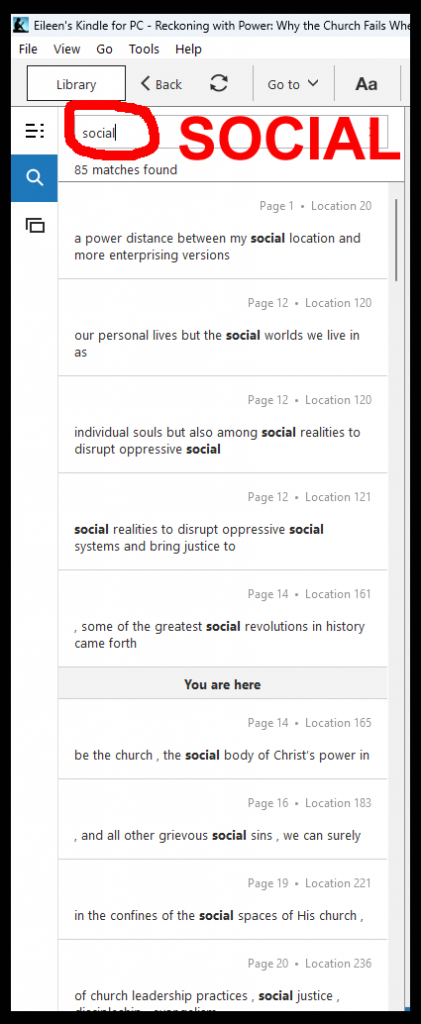
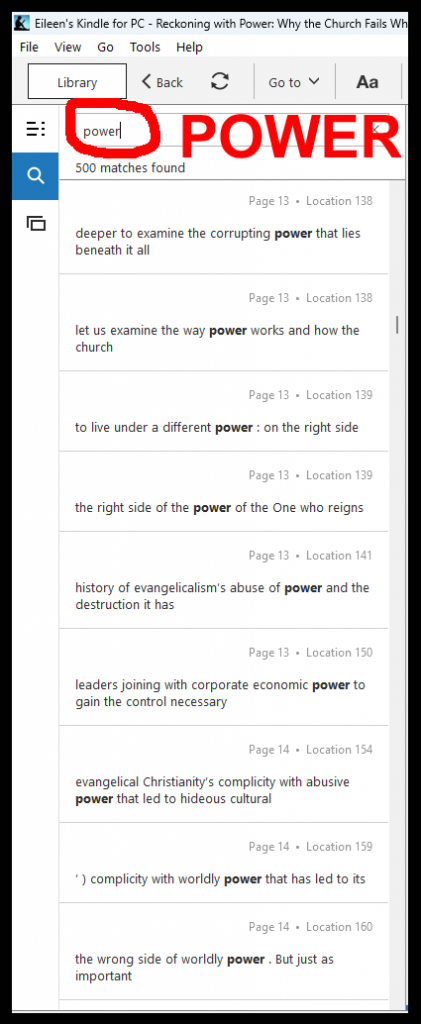
As mentioned earlier, to understand where Fitch gets his heretical ideas, we need examine the thinkers/resources he quotes from. In this next section, I will identify who these people are and give an initial understanding of their views and historical influence. I urge the serious-minded to research all of these names/figures more deeply, so that when you encounter their ideologies embedded in seemingly Christian (“Jesus-ized”) language you will not fall for the deception that these ideas have their genesis in scripture.
Judith Butler and Michel Foucault are listed among six of the top promotors of queer theory in this article from IU Bloomington Libraries’ Philosophy collection. I recently heard a commentator in this podcast name Foucault as the “godfather” of queer theory.

I can barely listen to Judith Butler’s presentation of her despicable, destructive, unbiblical teachings found in such talks as this one. To understand the connection between Marxism and gender issues, this presentation at a Genspect Conference in Denver by James Lindsay is a good place to start.
As one might expect at the beginning of any deconstructionist propaganda, Chapter 1 is titled, “Defining Power.”
Here we begin with Fitch’s proselytizing of CRT (Critical Race Theory). In fact, Fitch explains the political theory of CRT to his audience (but doesn’t name it as such), so they will understand “systemic violence and racism” (among other things).
His goal? For Christians to get on the “right side of power” and thus “reckon with it.” Throughout his book, Fitch relies on a concept of Christians divesting of forms of power and privilege he names as “power over” and adoption of “power under” or “power with.” His thinly-veneered political agenda for the Church (which he re-defines as being on “God’s side of power”) is revealed to the critical listener in bold relief for that which it is.
Fitch states:
“We believe that by educating people to be more aware of their racism, patriarchy, misogyny, paternalism, abuse of power, and all other grievous social sins, we can surely induce these people to repent and change. And all these approaches will surely accomplish some changes. But I suggest that, apart from reckoning with the power that undergirds our systems, drives our cultures, and corrupts our leaders, these changes will merely be window dressing, making things look better while the same power with its corrupting tendencies perpetuates itself until the next time it blows up in our faces all over again. These changes will at best be a bandage put over the problem of power, covering over the cancer that metastasizes beneath the surface of our lives. This book urges us to avoid bandage solutions to this gaping wound of the church, a wound we name as the abuse of power. Instead, let these sins of power be revealed for the sinister forces they are, at work deep beneath the surface of our lives as Christians in the West. The problem, you see, is power. It is not just the wrong use of power. It is being on the side of the wrong power. It is being on the wrong side of power. We need a theology and practice that enables us to see power for what it is and see how it works so we can be on the right side of God’s power, under the power of God unleashed in Jesus’s person, work, and reign, participants in the power of the Holy Spirit extended from Jesus and at work in us and around us.”
–Fitch, David E.. Reckoning with Power: Why the Church Fails When It’s on the Wrong Side of Power (p. 16). Baker Publishing Group. Kindle Edition.
Note Fitch’s use of the words “we can surely induce these people to repent and change.” Does he actually mean “coerce” rather than “surely induce?” And, who are “these people” that need such re-education?
Since there are mentions of The Holy Spirit in the above quotation, this seems a good place to introduce Fitch’s stated views about the gender/pronouns of the Godhead. He writes:
“On Gender-Inclusive Language for God
–Fitch, David E.. Reckoning with Power: Why the Church Fails When It’s on the Wrong Side of Power (p. 21). Baker Publishing Group. Kindle Edition.
One little note before we dive into this journey. Over the years I have struggled much with the well-known problem of using masculine pronouns to refer to God. I deeply sympathize with all women and men who hear patriarchy and abuse every time God is referred to as a “he” or “father.” I haven’t come to peace with how to rectify this issue, maintain the interpersonal nature of God, and maintain a sense of the history of the tradition, all at the same time. This book argues with no reservation that God and godly power are not coercive, never “power over,” always interrelational, never patriarchal. It is because God is interrelational that I need to express God as a person. To speak of God as “he” and “him” or as “she” and “her” does this because gender describes an interrelation. But I wish to do so in a way that disrupts and overcomes patriarchy. It is in this sense that I continue to use masculine pronouns and “Father” for God and Jesus the Son and feminine pronouns to refer to the Holy Spirit (in line with a historical precedent). Yet each time I do, I have chosen to capitalize the terms. By maintaining gender in my language for God I do not mean to say God is actually physically gendered, male and female. I mean to say God is interrelational. In that God created humans as gendered “in God’s image” (Gen. 5:1–2), I believe I am highlighting the personal nature of God, that God is in relation, whenever referring to God as “He” or “She” versus another term. It is to affirm God as triune God, interrelational, and creator of creation. I hope all people can give me grace as they read this text, as I am signaling with each capitalized term that I am using these terms in this specialized way. For now, this is my solution, perhaps a temporary one...And so let us journey together. Let us explore the history, the Scriptures, the sociology, to discover God’s way in navigating power.”
Again, as they say, that’s a lot to “unpack.” As I read and re-read Fitch’s gobbledygook in the above statement, I pause to note that it is only in the minds of recent, post-modern deconstructionists that the “gender” or use of “masculine” pronouns is (arguably) a “well-known problem” or otherwise associated with “abuse.” In like manner, the idea of patriarchy has been formed by neo-Marxist activists in their attempt to subvert the systems of society that preserve stability.
Remember, it is never about the “issue,”
it is about the “revolution.”
Later in his book, Fitch makes statements such as the following, concerning the “she and her-ness” of the Holy Spirit:
#1
“The earliest churches lived “under” the power of Jesus. He breathed on the first disciples the power of the Spirit, and He sent them out into the world under Her power with the keys of the kingdom (John 20:23).”–Fitch, David E.. Reckoning with Power: Why the Church Fails When It’s on the Wrong Side of Power (p. 74). Baker Publishing Group. Kindle Edition.
#2
“God’s power works where persons and institutions make space for Him, discern His working, and cooperate with Him at work in the world. Here the Holy Spirit, through Her relational engaging and loving power, works to heal, disrupt, and even transform. Where there is no space for God, however, God will not impose. This all-powerful God, as revealed in Christ, will not coerce anyone with His power. By His nature, He is love. He works in and among noncoercive relational space.”–Fitch, David E.. Reckoning with Power: Why the Church Fails When It’s on the Wrong Side of Power (p. 92). Baker Publishing Group. Kindle Edition.
#3
“There are many forms of “power over,” some more congenial to our Christian tastes than others. There are ways to justify the use of worldly power with the highest intentions. But God is calling the church to more. As we saw earlier, if Jesus is not at the center of our lives and the ways we lead and move in the world, we will end up leading with “power over.” And all our work shall either be limited to minimalist achievements (preservative in nature) or end up in narcissism, abuse, and destruction. Without Jesus at the center, without making space for the Spirit to work, without coming under Her power, we will end up taking over control all over again. In the words of that pastor to me, we’ll end up doing it all over again.”–Fitch, David E.. Reckoning with Power: Why the Church Fails When It’s on the Wrong Side of Power (p. 131). Baker Publishing Group. Kindle Edition.
#4
“The hold of worldly “power over” the congregation had been broken because the one in perceived power submitted first. The space of mutuality was opened up for the Holy Spirit to do Her work.“–Fitch, David E.. Reckoning with Power: Why the Church Fails When It’s on the Wrong Side of Power (p. 141). Baker Publishing Group. Kindle Edition.
#5
“There may come a time for an IGTHSUS meeting, but we will not rush. God the Holy Spirit is at work among us through Her people. And when we do have some understandings and wisdom to apply to the church as a whole, or to a denomination as a whole, it will come from the reports of real persons’ lives. We will offer practices of discipleship through the power and presence of the living Christ, not rules to be enforced over people’s lives. These will be the signs we are living on the right side of power.”–Fitch, David E.. Reckoning with Power: Why the Church Fails When It’s on the Wrong Side of Power (p. 157). Baker Publishing Group. Kindle Edition.
#6
“And so instead of using the wheel of worldly power, let all (heterosexuals go first) make space for the sweeping work of the Holy Spirit to convict and to lead us in lament, repentance, healing, reconciliation, and transformation. This is the way of godly power. Out of these spaces we shall discern the Spirit, allow Her to work, and unleash the forces of godly power among us. Let us be a truly different kind of people.”
–Fitch, David E.. Reckoning with Power: Why the Church Fails When It’s on the Wrong Side of Power (pp. 182-183). Baker Publishing Group. Kindle Edition.
I want to comment on statement #5 with two points.
First, this quote about the “IGTHSUS” process in Fitch’s church (an acronym for “It seemed good to the Holy Spirit and to us”) seems to set the stage for later comments (pages 180-182) that seem to involve advocating for a process of “discernment” about how a local church should respond to issues of sexuality/gender. Why would such a process be needed when the scriptures tell us that which we need to know/understand for “life and godliness?”
“One way to read this tragic litany of stories and statistics is that our LGBTQ brothers and sisters have suffered under the hegemonic structures of sexuality enforced by the churches via worldly power. In the process, the structure of this sexuality—and I am talking heterosexuality—has never been examined for its own toxicity, its cultural pollution, its enforcement of a “regime” that says you must look like this and feel like this to be a Christian. In response, the easiest thing to do might be to enforce a corrective via worldly power—affirm LGBTQ as part of this enduring regime or in reaction to this regime—without ever examining, unwinding, questioning, and seeing what the Spirit is doing to disrupt and heal the entire sexual formation of the evangelical church.”
–Fitch, David E.. Reckoning with Power: Why the Church Fails When It’s on the Wrong Side of Power (p. 182). Baker Publishing Group. Kindle Edition.
Once again, Fitch composes a lot of gobbledygook that needs a good “unpacking” in the above statement. Once again, we must keep in mind it is never about the issue of any form of sexuality, it is about the revolution. I dance around the urge to say that Fitch nears blaspheme in stating that we should consider what “the Spirit” is doing to “disrupt and heal the entire sexual formation of the evangelical church.”
The keyword is disruption.
“The core characteristics of the kind of disruption I’m describing, as we’ll see in the historical episodes that follow, are that it: 1) stems from a loss of faith in a society’s central institutions; 2) establishes a set of ideas from what was once the fringe of the intellectual world, placing them at the centre of a revamped political order; and 3) involves a coherent leadership group committed to the change. These disruptions are apparent in, but not synonymous with, some of the events commonly called revolutions. Disruptions don’t always change who is in charge – they are, in fact, sometimes necessary to preserve a government that is on the verge of failure. But they will at the very least change the way that a governing group thinks and acts.
–How disruptions happen
Disruptions bring a profound shift in people’s understanding of how the world around them works.”
Secondly (regarding #5), I find the statement “Her people” doubly disturbing. In John 14 and John 16 we are given a description of the Holy Spirit as the Advocate/Comforter/Spirit of truth; we are told by Jesus that He (the Holy Spirit) will guide us into all truth and will speak that which He hears from Jesus. We are told that He (The Holy Spirit) cannot be received by “the world” and will “prove the world to be wrong” about sin, righteousness and judgment.
“If you love me, keep my commands. And I will ask the Father, and he will give you another advocate to help you and be with you forever— the Spirit of truth. The world cannot accept him, because it neither sees him nor knows him. But you know him, for he lives with you and will be in you.”
— John 14:15-17
“All this I have spoken while still with you. But the Advocate, the Holy Spirit, whom the Father will send in my name, will teach you all things and will remind you of everything I have said to you.”
–John 14:25-26
“But very truly I tell you, it is for your good that I am going away. Unless I go away, the Advocate will not come to you; but if I go, I will send him to you. When he comes, he will prove the world to be in the wrong about sin and righteousness and judgment: about sin, because people do not believe in me; about righteousness, because I am going to the Father, where you can see me no longer; and about judgment, because the prince of this world now stands condemned.
“I have much more to say to you, more than you can now bear. But when he, the Spirit of truth, comes, he will guide you into all the truth. He will not speak on his own; he will speak only what he hears, and he will tell you what is yet to come. He will glorify me because it is from me that he will receive what he will make known to you. All that belongs to the Father is mine. That is why I said the Spirit will receive from me what he will make known to you.”
— John 16:7-15
In the historic creeds of the Christian Church (both Catholic and Protestant) the Godhead is summarized; and historically, Christians hold that the Spirit “proceeds from the Father and Son and with the Father and Son is ‘worshipped and glorified.’ ” (The Nicene Creed)
While understanding/articulating the doctrine of the Trinity presents many difficulties and can be hard to grasp, I don’t know that I’ve ever heard a Christian state anything indicating ideas of a possessive position (for example, stating “The Holy Spirit’s people”…in parallel of Fitch stating with feminine pronoun reference “Her people” as his statement seems to imply) of the Holy Spirit in relation to the Church. This aberrant linguistic warrants deeper scriptural examination by those with a deeper theological knowledge. I am simply a layperson, but I believe this statement (as well as the overlay of feminine pronouns upon the original texts/words of scripture) raises red flags.

__________
Fitch continues setting the stage in this first chapter by (re)defining power in a way that achieves his goal, and he directly quotes Judith Butler. Judith Butler is mentioned in Fitch’s footnotes three other times, and Foucault is mentioned in his footnotes ten times.
“Queer theorist Judith Butler argues there is a force in nonviolence. For her, relationality, interdependency, and vulnerability are the conditions for the thriving of human life. So being present with your body in vulnerability in the face of conflict can expose the ways we are mutually interrelated and then make space for working together for human thriving. A power is released in this nonviolent with-ness that works for goodness and life.” –Fitch, David E.. Reckoning with Power: Why the Church Fails When It’s on the Wrong Side of Power (p. 35). Baker Publishing Group. Kindle Edition.
“And so, after feudalism, power emerged differently. As cultural theorist Michel Foucault describes, power no longer relied on pure violence or military force to achieve its outcomes. Such overt violence was now broadly unacceptable in modern life. So power went “underground,” from being exercised by one person (either personally or through an organization) over another via brute force, to being woven within a field of relations, a set of rules and practices, whether it be work, education, politics, or church. Each social system has its way of getting you to do things without overt violence.”–Fitch, David E.. Reckoning with Power: Why the Church Fails When It’s on the Wrong Side of Power (p. 27). Baker Publishing Group. Kindle Edition.
According to James Lindsay (and I paraphrase what I took away from his talk), in deconstructing that which is normal (biological sex), the “normal” becomes a type of commodity or capital. “Normal” is akin to the idea of “bourgeois capital” and it can be taken away from the elite or the “oppressors.” In a very real sense, the work of Judith Butler has contributed to the dismantling of sexual normalcy. By Marxifying gender, power/capital is then redistributed (through the divesting of “privilege” and the “normal”) and regathered toward the subversive “revolution”—because remember, it is never about the issue (gender, equal rights and so-called justice)–it is always about “the revolution“. (for more on this dialectic, refer to James Lindsay’s talk “Gender/Marxification/Ideological/Brainwashing.”)

Moving on along here, I turn next to Fitch’s positive mention of Walter Rauschenbusch, otherwise known as The Father of the Social Gospel (this linked article upon glance-through seems to hold a lot of good information). And as if the social gospel wasn’t scripturally controversial enough, Fitch moves on in some positive sense to liberation theology.
Fitch writes:
“Liberation Theology: Being on the Right Side of Power
–Fitch, David E.. Reckoning with Power: Why the Church Fails When It’s on the Wrong Side of Power (p. 178-179). Baker Publishing Group. Kindle Edition.
The notion of being on the wrong side of worldly power is not novel. For decades, liberation theologians have put forth the truth that God is recognized among the oppressed, on the wrong side of worldly power. God’s power is released among the poor. It is among the powerless (in worldly terms), those with no access to worldly power, that we shall find God’s power at work by His presence. This relation between power, posture, and discernment has been explored by Latin American, Feminist, Mujerista, Womanist, and Black liberation theologians. For them, the church has too often been on the side of worldly power when it needed instead to go and be with the oppressed in order to discern who God is and how His power is at work in the world. Liberation theologians describe this dynamic as “the epistemological privilege” of the poor. God’s “preferential option” is to work via His power among those who are open to Him. Mujerista theologian Ada María Isasi-Díaz says that we “can see and understand what the rich and privileged cannot. It is not that the poor and oppressed are morally superior or that they can see better. Their epistemological privilege is based on the fact that, because their point of view is not distorted by power and riches, they can see differently.” And so, deep within the wiring of liberation theology, a theological method emerges that teaches the church to discern what God is doing not by discerning the right side of history as seen from a privileged vantage point but rather by being present on the right side of godly power, postured among the powerless, where God is already at work. In his groundbreaking book God of the Oppressed, Black liberation theologian James Cone explains that “to know Jesus is to know him as revealed in the struggle of the oppressed for freedom.” There is this searing illumination of God, “concrete signs of divine presence, among the lives of the poor.” Cone describes this illumination as “the liberating power of black experience,” where the relational power of God’s presence is at work in the world, drawing people to reconciliation, justice, and renewal among the marginalized. Over and over again Cone talks about the problem of distance and “power over,” the posture of White supremacy, which blinds even his own colleagues at Union Seminary from seeing and understanding God at work for justice in the world. And so, Cone exemplifies the main theme of this book: if we want to discern what God is doing, if we desire to partake of God’s power, we must resist being on the wrong side of worldly power, instead seeking the right side of godly power, under the power and presence of the Holy Spirit. Instead of trying to be on the right side of history, let us seek to be the church on the right side of God’s power, participating in His work in the world.”
And now, I move on to give a sampling of Fitch’s views on what I consider the most pressing and potentially destructive issue our nation and world is currently facing and of which I’ve already made other references: Gender.
For the record, I consider the power behind the great gender deception beyond worldly or individual powers. I consider the destruction and mutilation of our children, their bodies, families and future generations none short of demonically-driven power and deception. I will have nothing generous to say of those in positions of Church power (as Fitch is, and of which I will next comment on following some of his gender-related quotations).
Fitch states:
“Sexuality on the Right Side of Power
–Fitch, David E.. Reckoning with Power: Why the Church Fails When It’s on the Wrong Side of Power (pp. 179-180). Baker Publishing Group. Kindle Edition.
All this being said, the church seems prone to blurring the powers in order to accomplish God’s justice. We are ever tempted to take the reins of top-down, coercive, legislative “power over” to get God’s work done. How do we learn from the mistakes the White evangelical church has made as it has capitulated to the evils of slavery, patriarchy, and economic exploitation every time it has aligned itself with worldly power? How do we avoid making the same mistakes in relation to the social ills and conflicts that plague our cultures today? Will we work from the wrong side of power, aligning with power over, or will we make space for the power of God, the Holy Spirit, to work among us as we make space for God’s presence to work in all the struggles we face. Can we be a different people? The conflict over sexuality stands preeminent as one of those conflicts before us today. We are often warned against being on the wrong side of history regarding this conflict. As church leaders, we are tempted to issue a policy directive: our church “does not affirm” LGBTQ sexuality or our church “affirms” LGBTQ sexuality. But such edicts, in either direction, could miss the opportunity for God and His power to work among us. It may soothe the impatience, the hurt, the pain, or the insecurities among us. But it only works based on power and solves little of the bigger issues going on among us in the areas of sexuality and gender. As already described, queer theorists teach us that within the dominant construals of male and female sexuality lie misogyny, coercion, sexualization of bodies, patriarchy, and toxicity in the guiding assumptions about what one must look like, act like, and feel like. Several theorists argue that lesbian or gay sexualities must escape the determinations of heterosexuality to truly be free from patriarchy, sexualization, and other maladies that plague human bodies in today’s sexuality and gender cultures. To affirm or refuse to affirm LGBTQ sexuality with a policy does not address any of these issues. It does not address the ills within the heterosexual formations among us. It avoids discerning any pain among LGBTQ persons perpetuated by those heterosexual formations. Such policy statements in effect become bandages covering the antagonism, brokenness, and pain that simmers among us. It could be that those among us who are gay, lesbian, bisexual, queer, or trans are calling into question a lot of the toxic sexuality and gender relations that have become hegemonic in our churches, unquestioned as natural, and endorsed as Christian and normative. The presence of LGBTQ persons among the church could be the moment to make space, listen, be convicted, be challenged, repent, and be transformed, all of us together, by what God by the power of the Holy Spirit might do among us. It therefore seems unwise to make policy statements as churches or denominations in these times of discernment. Let us instead offer a path of discipleship that is inclusive of all people—and heterosexuals should be first in line. Instead of seeking the right side of history, let us seek the way of God’s power. This may seem to fly in the face of those who see the church as once more on the wrong side of history in regard to sexuality. These folk see the church, just as with slavery, racism, women’s rights, and economics, as being slow to affirm those who are marginalized. We must seize the levers of power to make things right. But again, as in all these other moments in church history, I urge the church to resist the ways of worldly power and instead be among those who identify as, or struggle with, LGBTQ sexualities. Let us make safe, welcoming, and inclusive spaces for conversation. Let us listen carefully, discerning and inviting the Holy Spirit to work among us.”
And now as I earlier indicated I would, I pause to make comments concerning Fitch’s position of Church power. On page 22 of his book, Fitch asks us for “grace,” and as uncomfortable as it feels to me I cannot give “grace” to someone who is wielding such destructive power in God’s Church. Fitch is operating with a top-down power (due to his position as a seminary professor). But what he is also doing is enacting through his positional authority, the development of an undergirding/foundation which threatens to dismantle biblical Christianity. And it is for that reason that we all need to identify his errors (and those of similar theological bent) and speak out. May God’s grace open Mr. Fitch’s eyes (and those of his disciples) to God’s truth as revealed in His word.
Though institutions such as Northern Seminary (of which Fitch holds position of “Betty R. Lindner Chair of Evangelical Theology”) are Christian-based institutions, they follow to some degree a worldly model of power which would include (potentially) Fitch’s status of tenure. I’m venturing into realms that are above my understanding of the way things work, but as I understand it, when professors become tenured it opens them up to speak more freely on any matter and hold any opinion, as they cannot be fired.
“The purpose of tenure is to protect a professor’s academic freedom.” — Source
Potentially, Fitch can speak with impunity things that are theologically off base (heretical) and contrary to historic scriptural understandings, and thereby promote/train/proliferate numerous pastors under his position of power and discipling. This leaves Fitch (and those like him), ironically, in positions of immense power over God’s Church.
In fact, the Church must recognize the immense power such “parachurch-leading” individuals and networks hold over doctrinal purity, church practice and mission. These cohorts of Church activists talk a lot about new “missiology,” but that is far beyond the scope of this book review. We must recognize infiltration of false doctrines/false gospels/false missions through such unaccountable means and networks that wield power.
Some of these networks would include He Gets Us, Gloo, Revoice, Preston Sprinkle’s Theology in the Raw/Exiles in Babylon and a number of other Church movements and institutions that are not structured with the biblical model of accountability through local elders, bishops, presbyters and such. These “para-church” organizations, communities and bible teachers bypass the biblical model that hold Shepherds accountable, operating more as a worldly organization or corporation. Actually some of these so-called Christian para-church movements are being funded by the godless: undisclosed corporate business entities that wield political agendas.
In the last chapter, Fitch devotes a lot of emphasis to the idea of “parrhēsia” which is connected to the ideology/dialectic of Foucault and, according to Fitch, should be incorporated into various contemporary Church practices. Essentially, this explanation he gives of “parrhēsia” highly resembles the rhetoric of worldly social justice activists who say they are “speaking truth to power.” Even the title of Fitch’s book bears a thin veneer of connection to “speaking truth to power,” the phrase “reckoning with power” being far less than the proverbial hop-skip-and-a-jump from that idea:
“As we live in the world of fake news, Twitter storms, conspiracy theories, and political antagonisms, we are tempted to doubt whether truth can even be possible in a way that changes the world. But, as philosopher/cultural theorist Michel Foucault argued, parrhēsia is powerful political speech. In a lecture series on parrhēsia delivered at the University of California, Berkeley, he showed that truth telling can have a profoundly subversive, revolutionary impact down through history.”
–Fitch, David E.. Reckoning with Power: Why the Church Fails When It’s on the Wrong Side of Power (p. 159). Baker Publishing Group. Kindle Edition.
“…The believers got together and prayed for more unstoppable parrhēsia (v. 29). They praised God, inhabited His reign, were filled with the Holy Spirit, and spoke the word of God with more parrhēsia (v. 31). And a social revolution began. It is all an example of how the practice of parrhēsia working and how speaking truth as Christians put us on the right side of power.”
–Fitch, David E.. Reckoning with Power: Why the Church Fails When It’s on the Wrong Side of Power (p. 160). Baker Publishing Group. Kindle Edition.
Fitch’s writings seem to count upon two things: (1) that both on his (naive) readers know very little (or want to know very little) about the teachings/methods of Marxism and related “theologies,” and (2) that his (intentional) readers know quite a lot about the teaching/methods of Marxism and related “theologies.” In this way, he wins the allegiance/devotion of many who become enamored (for one reason or the other) of Fitch’s seemingly avent-garde, “Church think tank” envisioning. When we understand that Fitch is simply re-bottling and serving up Marxist utopia with a Christian rubberstamp, we will understand why these teachings must be strongly denounced.
“In French, avant-garde means the “vanguard” or the “advance guard” — basically the people and ideas that are ahead of their time. Usually it refers to a movement in the arts, like Dadaism, or in politics, like anarchism. Avant-garde can also be used as an adjective to describe something that’s cutting-edge.”
– Source
No matter how one wants to dice up Fitch’s manifesto, the work drips with Marxist ideology. And THAT, is the power that needs to be reckoned with. If you want to explore this work for yourself, buckle up and prepare for a lot of virtue-signaling linguistics. I end this review with both a chart as well as visual summaries of such words–just how many times various social justice/neo-Marxist buzzwords can be found within this 221-or so-page essay. Perhaps it is akin to the old “duck test.”
“If it looks like a duck, swims like a duck, and quacks like a duck, then it probably is a duck.”
The following chart shows number of times the Kindle search tool found usage of various words in Fitch’s book (total of about 221 pages):
| Power | 500 |
| work | 429 |
| Jesus | 218 |
| Space | 115 |
| Justice | 101 |
| Privilege | 93 |
| Wrong Side | 87 |
| Social | 85 |
| Right Side | 79 |
| Truth | 45 |
| Gender | 31 |
| Posture | 38 |
| oppress | 29 |
| Racism | 27 |
| Imagine | 22 |
| LGBTQ | 20 |
| Feminist | 17 |
| Patriarchy | 17 |
| Subversive | 15 |
| Toxic | 15 |
| Embody | 14 |
| Equal | 14 |
| Marginalize | 13 |
| Revolution | 13 |
| Subvert | 12 |
| Emerge | 11 |
| collective | 8 |
| Theory | 8 |
| Safe | 7 |
| Queer | 6 |
| Patriarchal | 5 |
| discern sexuality | 3 |
| labor | 2 |
| Marx | 2 |
| Dialectic/Hegel | 1 |
SPACE
~115 Search Results of Word Usage~












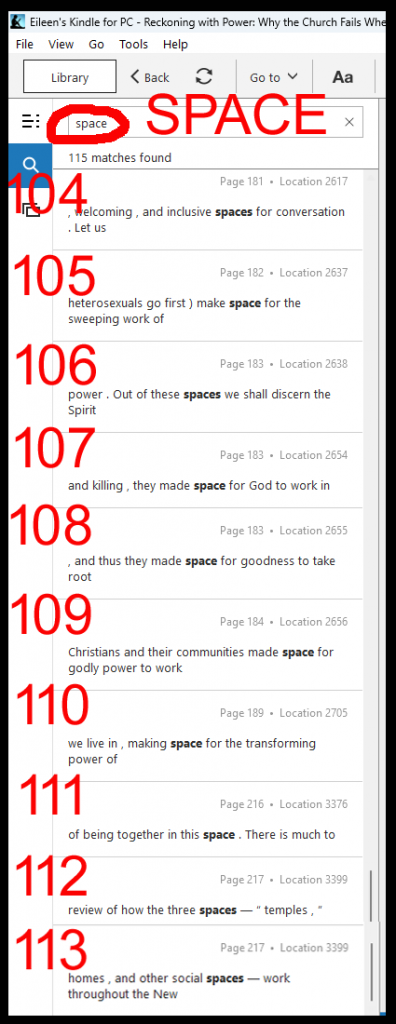
JUSTICE
~101 Search Results of Word Usage~
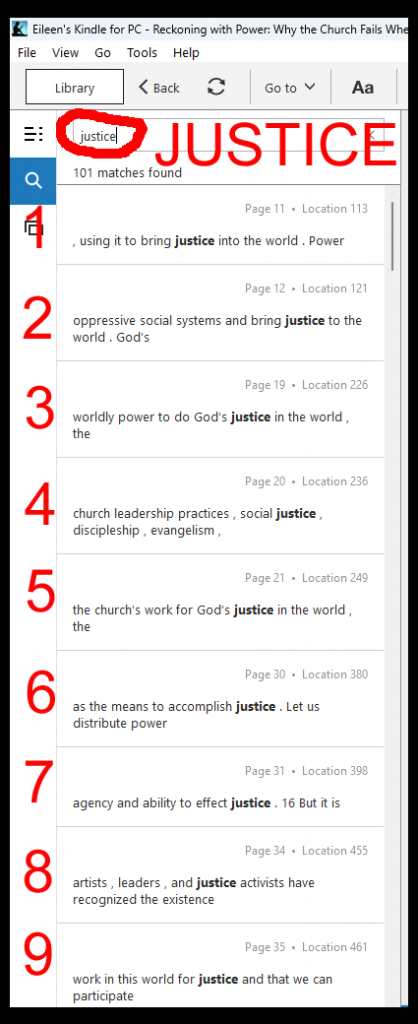







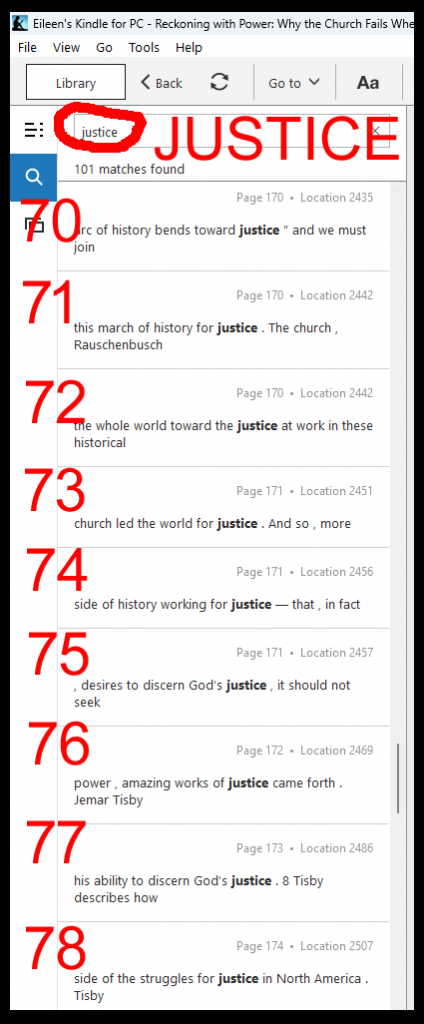

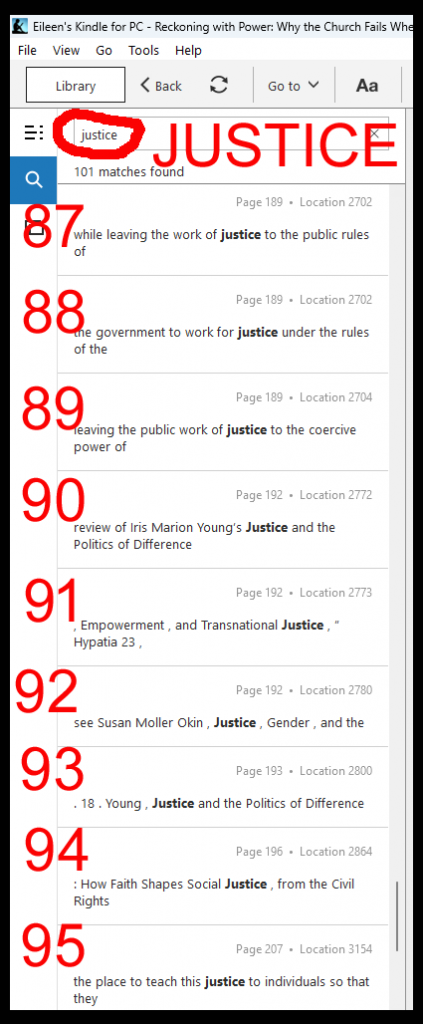

PRIVILEGE
~93 Search Results of Word Usage~

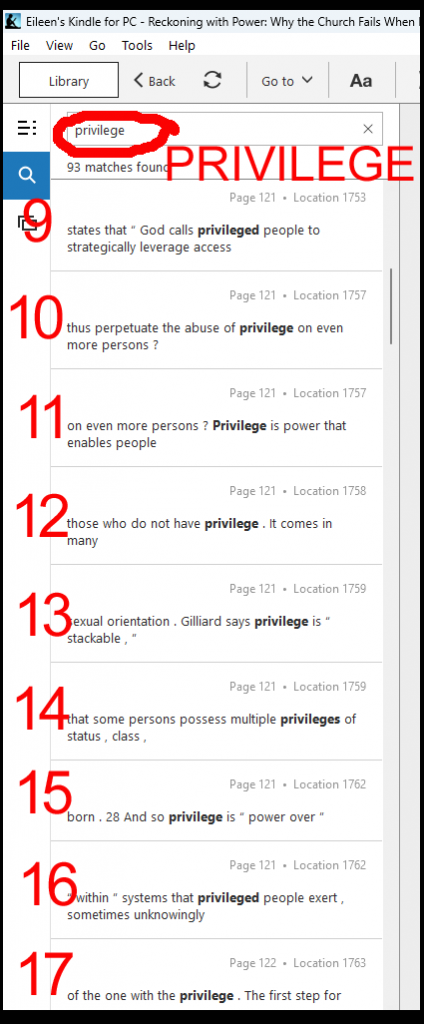



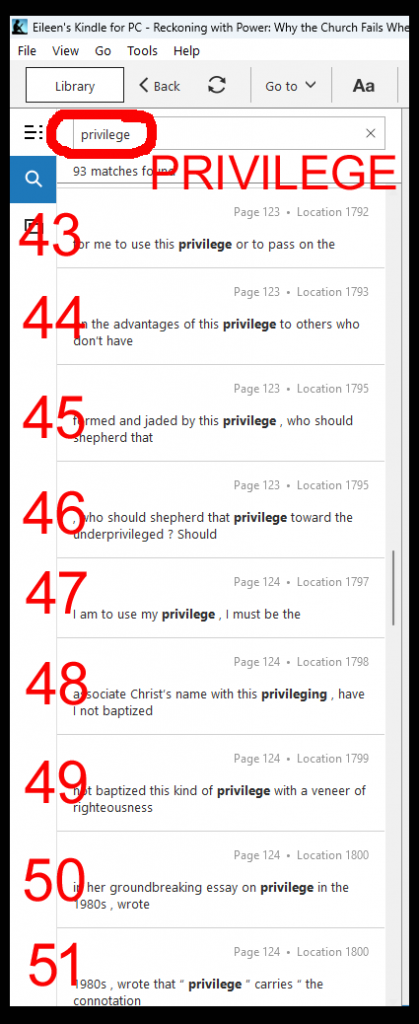
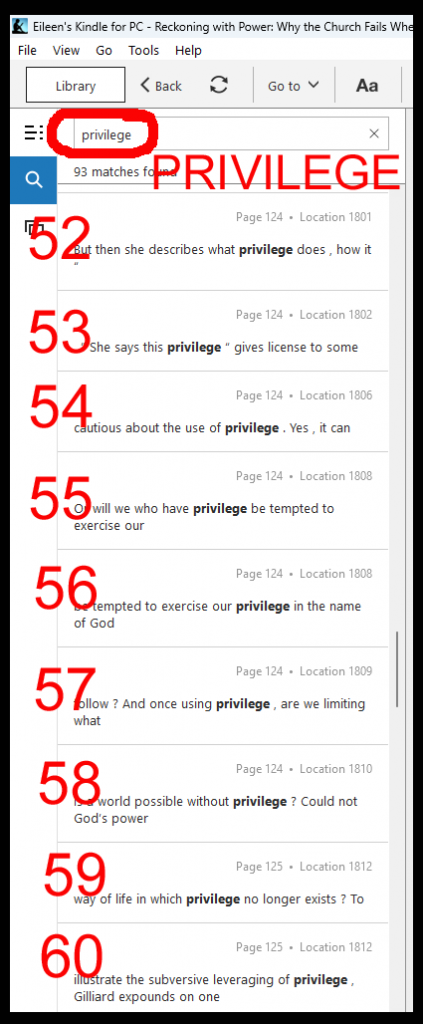

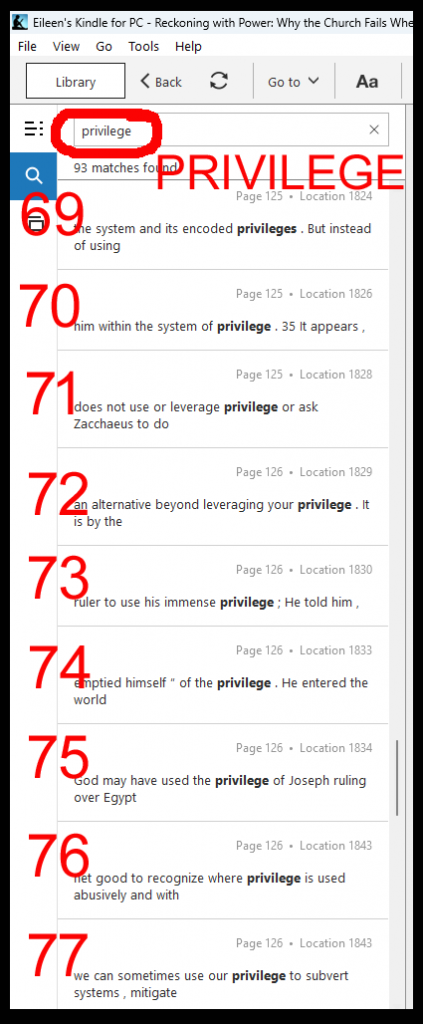


SOCIAL
~85 Search Results of Word Usage~

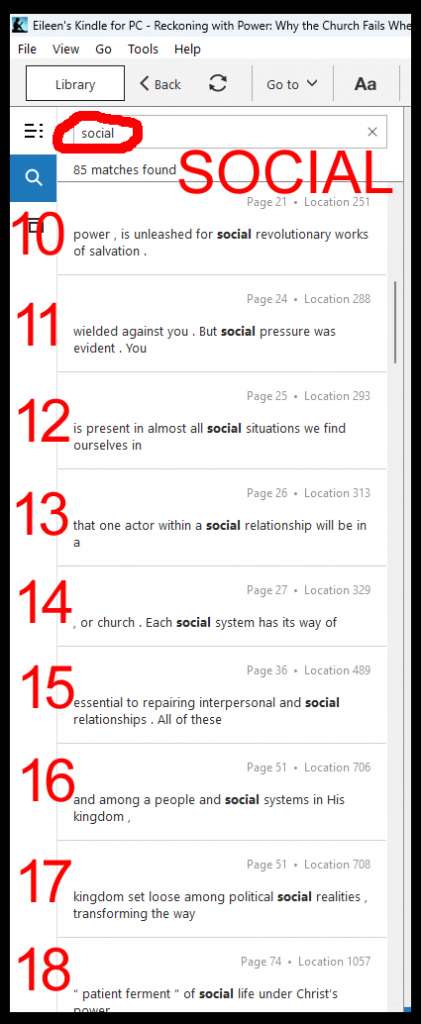

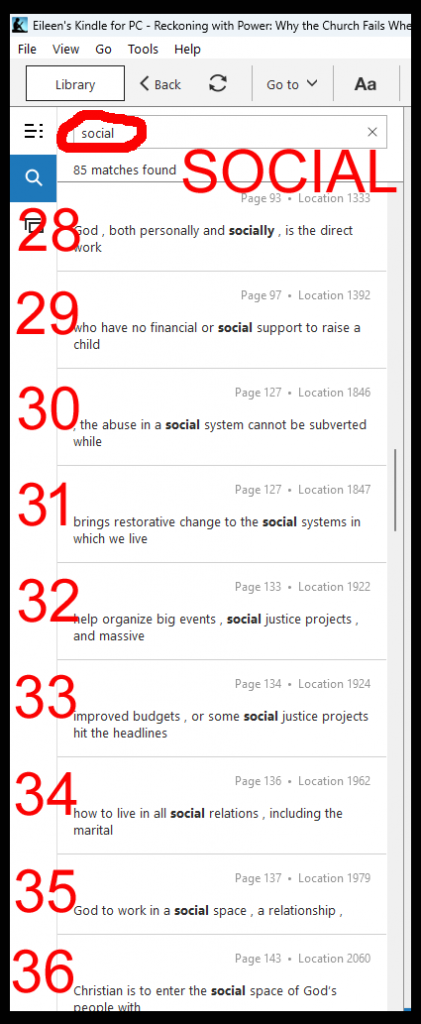






TOXIC
~15 Search Results of Word Usage~
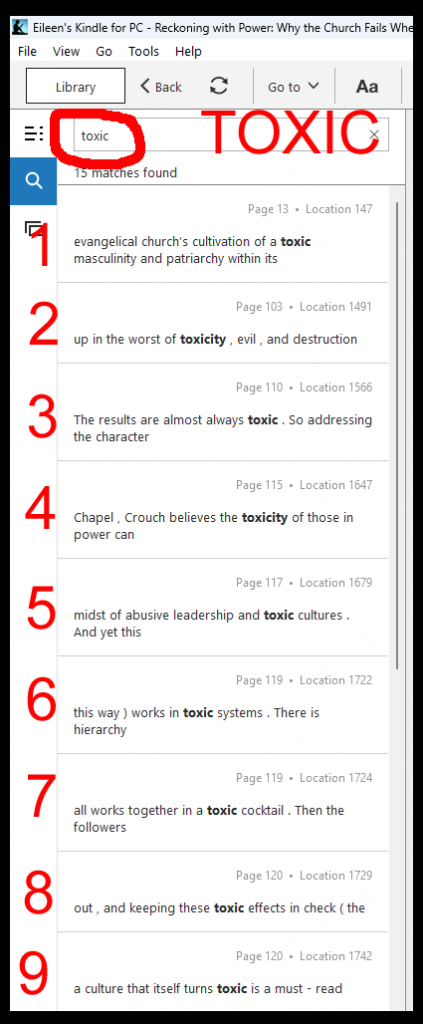

EMBODY
~14 Search Results of Word Usage~


EQUAL
~14 Search Results of Word Usage~


SAFE
~7 Search Results of Word Usage~

MARX
~93 Search Results of Word Usage~
“The church, as well, is urged to get on the right side of history. A century ago, following in the spirit of Hegel and Marx, American Protestants believed that inherent progress (called a dialectic) was built into history. Mainline Protestants were postmillennialists, believing that the kingdom of God had been set loose into history. Walter Rauschenbusch—to name one paragon of this theology—preached that the kingdom of God had entered history in Jesus.4 The church’s job, therefore, is to enlist Christians into this march of history for justice. The church, Rauschenbusch said, needed to cooperate with bringing the whole world toward the justice at work in these historical processes set loose in the kingdom of God.5
Fitch, David E.. Reckoning with Power: Why the Church Fails When It’s on the Wrong Side of Power (p. 170). Baker Publishing Group. Kindle Edition.”

________
Footnotes
1Fitch, David E.. Reckoning with Power: Why the Church Fails When It’s on the Wrong Side of Power (pp. 14-15). Baker Publishing Group. Kindle Edition.
Thank You For Reading
Please Feel Free To Express Your Thoughts Below


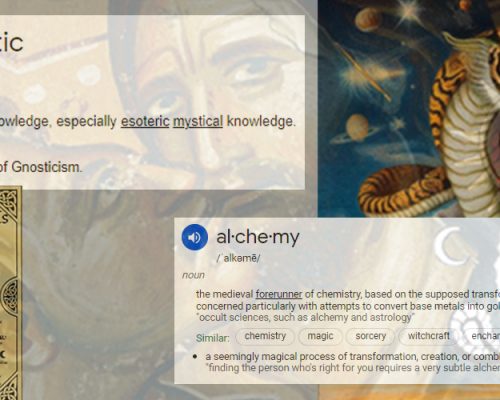
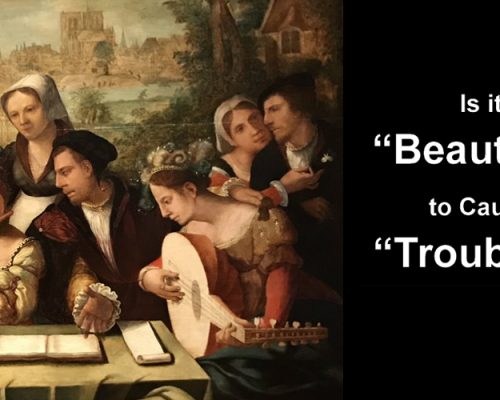
Chuck
December 4, 2024Eileen,
Thank you for this book review. I haven’t read the book, but I have many friends who are friends with Fitch and are aligned with his thinking. I thought we simply disagreed about Trump, but your review makes me realize the Marxist influence that is at work in the church. I thought I could just agree to disagree with my progressive friends, but I fear this goes much deeper.
I found your review extremely helpful, and it inspires me to do more research and fight for biblical truth. Thanks for blogging, and for taking the time to review this book so faithfully. Well done sister!
eileenslifer
December 5, 2024Hi Chuck,
Thank you so very much for taking time to encourage me. I sure wish I currently had more time to put other blog commentaries together. That one took a lot of organization and time, and I’m thankful to know that it was helpful to you and others (I’ve had some other comments on this piece too https://eileenslifer.com/2024/03/15/do-your-homework-series-fitch-foucault-rhor-zahnd-and-no-that-is-not-a-law-firm/)
I am just a “layperson” that has been personally affected by various things in my family context, and at one point I was influenced toward progressivism and forms of “New Thought” – so grateful God opened my eyes to some things and gradually brought me back to biblical thought and has given me a burden for what I now see. This stuff — transgender stuff and wokeism — has so deeply damaged my family and other young people I know. I’ve been a Christian since 1981, and I could have never imagined the kind of world we are living in and facing, and how both our grown children and even people my age and older are being “gobbled up” and deceived.
It’s all exhausting, and hard to witness it making its way into the Church.
Eileen